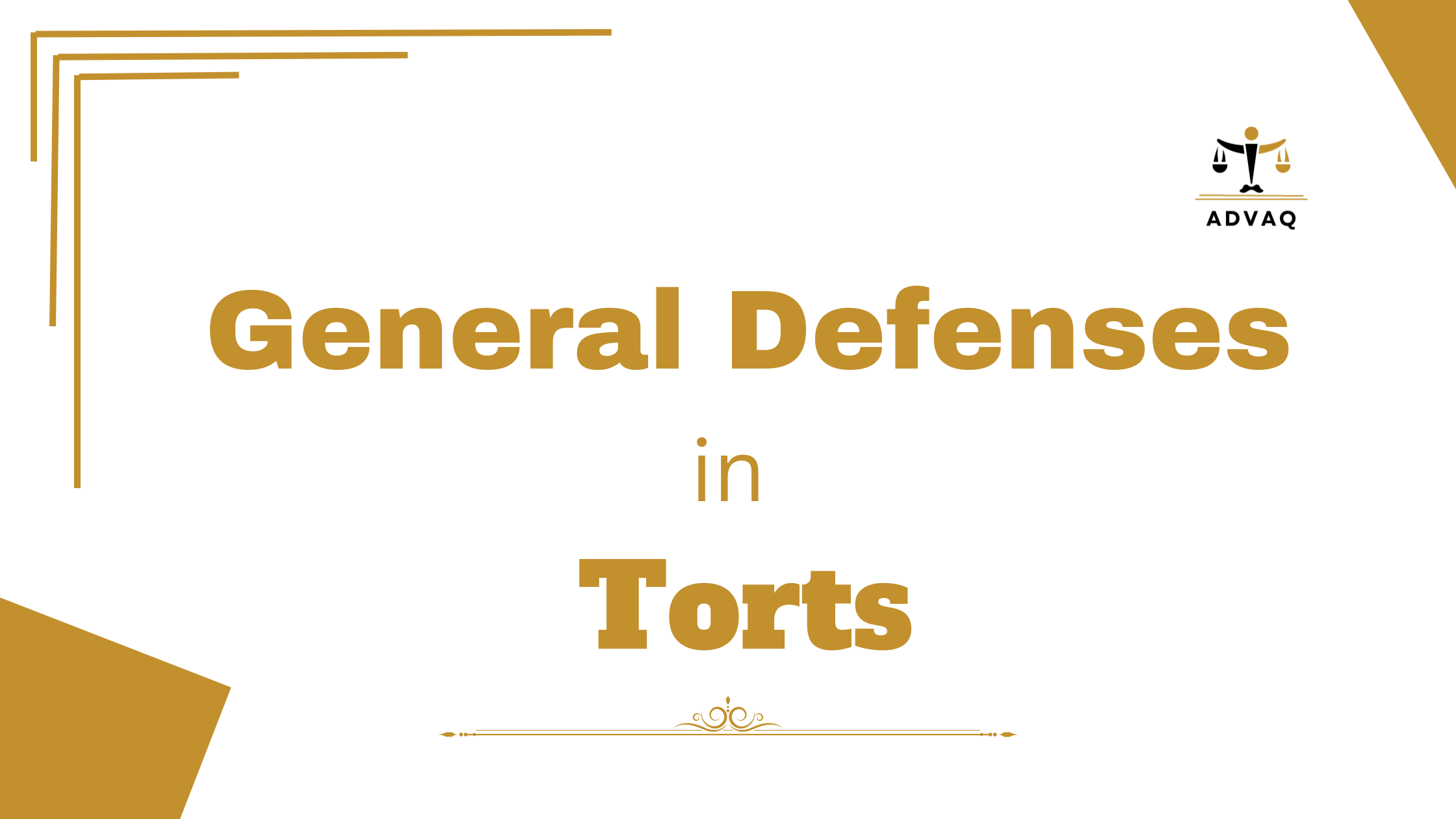INTRODUCTION
Defenses in torts are an important concept. There are some conditions that, when present, will prevent an act from being wrongful which in their absence would be wrong. In an action in tort, when the plaintiff proves the essential elements of the tort, the defendant may avoid general defenses or exceptions to liability in tort applies in his case.
CROSS-REFERENCE
- Sections 77,79,95 & 96 of PPC, 1860
MEANING OF DEFENSE
According to Black’s Law Dictionary:
A defendant’s stated reason why the plaintiff or prosecutor has no valid case, especially the defendant’s answer, denial, or plea.
DEFINITION OF DEFENSE
According to Oxford Dictionary Of Law:
In civil proceedings, the response by a defendant to service of the claim.
DEFENSES IN TORT / LAWFUL EXCUSES
An act or omission which is prima facie tortuous is not actionable if it is done under some lawful excuse. Following are the defenses, justifications, or grounds of immunity from liability to an action in tort.
1. MISTAKE OF FACT
A mistake of fact or genuine ignorance of the state of affairs does not excuse except in those cases where the motive is an essential ingredient to constitute the wrong.
2. JUDICIAL ACTS
It is an act done by a competent authority upon consideration of facts and circumstances and imposing liability or affecting the rights of others. A judge is expected to be independent and fearless. Hence, no action lies for acts done or words spoken in the exercise of his Judicial function although his motive may be malicious.
3. QUASI-JUDICIAL ACTS
A quasi-Judicial act is a judicial act performed by one, not a judge.
Explanation: Persons and bodies exercising (quasi-judicial powers, such as universities, colleges, clubs, etc.) are also protected from civil liability if they observe rules of natural justice and the particular statutory or conventional rules which may prescribe their course of action.
4. INEVITABLE ACCIDENT
By inevitable accident we mean accidents which cannot be avoided “by any such precaution as a reasonable man, doing such act then and there could be expected to take.”
Explanation: No action can be maintained for any injury arising from purely accidental causalities, in the prosecution of a lawful act. But if the act done is unlawful, an action lies.
5. ACTS OF NECESSITY
According to Black’s Law Dictionary
The word necessity means “the quality or state of being necessary, in its primary sense, signifying that which makes an act or event unavoidable.
Explanation: This justification called just necessitates (law of necessity) is based on the maxim Salus Populi Suprema Lax” which means the welfare of the people, is the supreme law.
6. EXECUTIVE ACT
These are the acts relating to administering affairs, to direct manage and execute or dispense.
Explanation: Valid orders of a public authority form a good defense to a tort committed by its officers in executing them, e.g., orders of the Court of Justice, etc.
7. ACTS CAUSING SLIGHT HARM
It is a well-recognized principle of law that nothing is wrong or offensive which a person of ordinary prudence would not claim. However, this principle does not apply where there is an infringement of a legal right.
8. PRIVATE DEFENSE
Every person has the right to defend his own person, property, or possession against unlawful harm.
Explanation: Every person is justified in using reasonable force to defend himself and those under his care.
9. PARENTAL AUTHORITY
Parents may inflict moderate and reasonable corporal punishment to correct what is evil in the child.
10. QUASI-PARENTAL AUTHORITY
A parent delegates to the schoolmaster all his authority when he places his child with him. Therefore, a schoolmaster exercises a sort of quasi-parental authority and can inflict a moderate punishment on his pupil for his welfare.
11. ACT OF STATE
It is an arbitrary act done not under the color of any legal title, but in exercising sovereign power intending that no remedy should lie.
In Pakistan: The Government cannot be held civilly liable for tortious acts committed by officers in performing duties imposed upon them by the legislature.
12. STATUTORY AUTHORITY
No action can be maintained for the act the doing of which is authorized by the legislature and the person injured by such authorized act has the only remedy provided by the statute itself.
13. AUTHORITIES FOR NECESSITY
The master of a vessel on the high sea or in a foreign part has disciplinary powers over the crew and passengers, based upon necessity and he is also limited to the preservation of necessary discipline and safety of the ship.
14. PLAINTIFF A WRONG-DOER
A person can recover damages for an injury caused to him by himself being a wrongdoer unless some unlawful act or conduct on his part is connected with the harm suffered by him as part of the same transaction.
15. ACT OF GOD
It is a good defense to an action in tort. An act of God is a direct, violent, sudden, and irresistible act of nature, which could not, by any reasonable cause, have been foreseen or resisted.
CONCLUSION
Compensation is the dominant motive of the law of Torts. To bring compensation to the plaintiff and to bring justice in society, the general defenses are essential to be given, to the executives, in their respective fields.
FREQUENTLY ASKED QUESTIONS
What are the various kinds of general defenses in tort? Give examples.
(2019-A 5 years)
Explain justification/defenses as enunciated in the law of torts.
(2018-A)
Define and explain defenses in an action of torts.
(2016-A
Write a detailed note on defenses available in an action for tort.
(2015-A, 2014-A)


